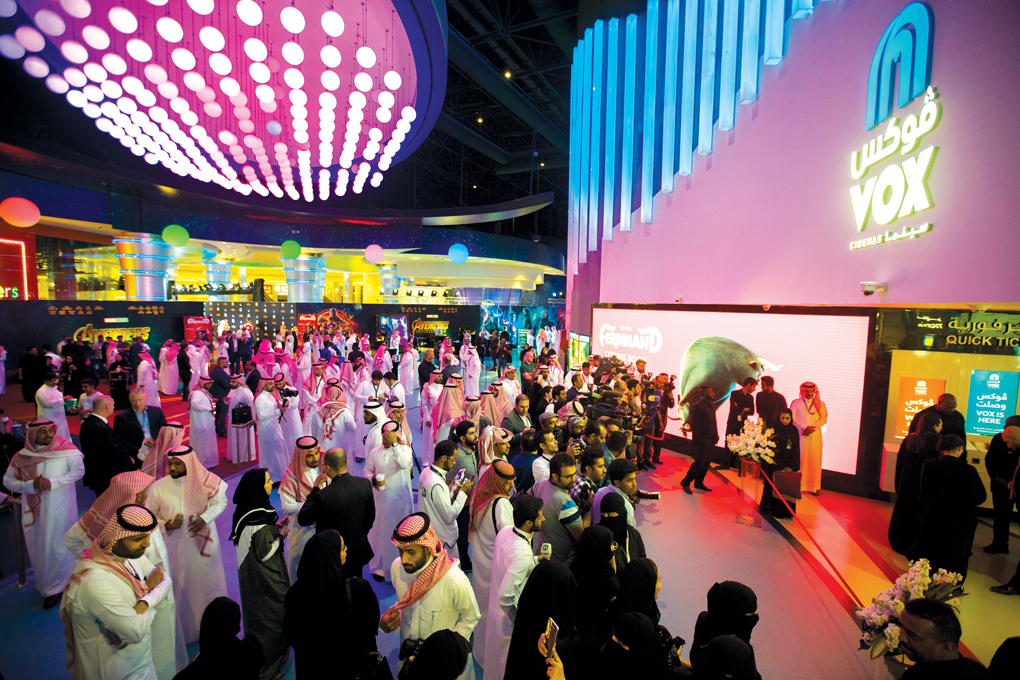RIYADH: Opening the biggest cinema in Saudi Arabia’s history “is a sign that Vision 2030 is real and unstoppable,” according to the man in charge of Vox Cinemas.
Alain Bejjani, the chief executive of the Majid Al Futtaim (MAF) leisure and retail group that owns Vox, told Arab News on the sidelines of the Future Investment Initiative (FII) forum in Riyadh that the new 18-screen cinema in Riyadh Front mall was part of his commitment to eventually launch 600 more screens throughout the Kingdom.
There are 71 screens now open with plans for 250 more by the end of 2021. “It shows that we walk the walk at MAF; we do what we say we will do,” Bejjani said.
MAF has been one of the most enthusiastic business partners of the Saudi Vision 2030 strategy to diversify the economy away from oil dependency.
“Saudi Arabia has been through a tough period of reform, but few countries would have stuck to it and been so true to the reform agenda in social, cultural and economic terms. Nobody can now ask whether the vision is going to happen or not, it is happening,” the CEO added.
MAF is planning more malls in the Kingdom with family entertainment and retail facilities, along the lines of its highly successful shopping centers in Dubai, such as the Mall of the Emirates with its world-famous indoor ski slope.

Majid Al Futtaim (MAF) has been one of the most enthusiastic business partners of the Saudi Vision 2030 strategy to diversify the economy away from oil dependency. MAF is planning more malls in the Kingdom with family entertainment and
retail facilities. (AN photo)
Bejjani spoke after appearing in a panel session at the FII with American rapper will.i.am to discuss artificial intelligence (AI) and a new AI-powered service and voice assistant. He said that MAF and the US singer were long-term partners in the project.
MAF’s business in the Gulf is highly dependent on consumer spending patterns, which have come under pressure in both its home market, the UAE, and Saudi Arabia as economic growth slows mainly because of the fall in the oil price.
Bejjani predicted that the Saudi economy would soon bottom out and start to improve next year.
In the UAE, he said that some sectors were “challenging” but there were still positive signs there. UAE consumers were becoming more price sensitive and were looking for value, but he noted that growth in tourism was still good, and that there could be a boost from visitors in the run-up to the Expo 2020 business exhibition next year.
“Saudi Arabia could also benefit from the Expo effect if visitors to the UAE make use of easier tourism visas to visit the Kingdom while they are in the region, and of course it is the year of the G20 for Saudi Arabia,” he added.
HIGHLIGHT
Majid Al Futtaim (MAF) has been one of the most enthusiastic business partners of the Saudi Vision 2030 strategy to diversify the economy away from oil dependency. MAF is planning more malls in the Kingdom with family entertainment and retail facilities.
The leisure industry chief pointed to Egypt as a very positive market. MAF recently opened its fourth mall in the country and has spent $2.7 billion of the near $3 billion it pledged in investment four years ago. “Now we are looking for more investment opportunities,” he said.
MAF is also aiming to extend its snow-themed leisure activities to China with the first ski slope outside the Middle East, in a mall near Shanghai.
Bejjani will be a co-chairman of the World Economic Forum at its Davos meeting next year, with responsibility for the Middle East and North Africa, and he is preparing a major policy initiative in a bid to boost the region’s growth via greater integration of its economies.
“The region has 8.5 percent of the world’s population, but only 3.4 percent of global GDP, and only 4 percent of the total foreign direct investment. Trade between regional economies is very low as a percentage of GDP compared to other big economic blocs like the European Union and South East Asia. This is something that really needs to change,” Bejjani said.
He is working on the final stages of a detailed policy study with international consulting group McKinsey on a “new vision for economic integration” as well as a group of “like-minded” businesses from the Middle East that will make recommendations at Davos to increase regional cross-border trade.



























